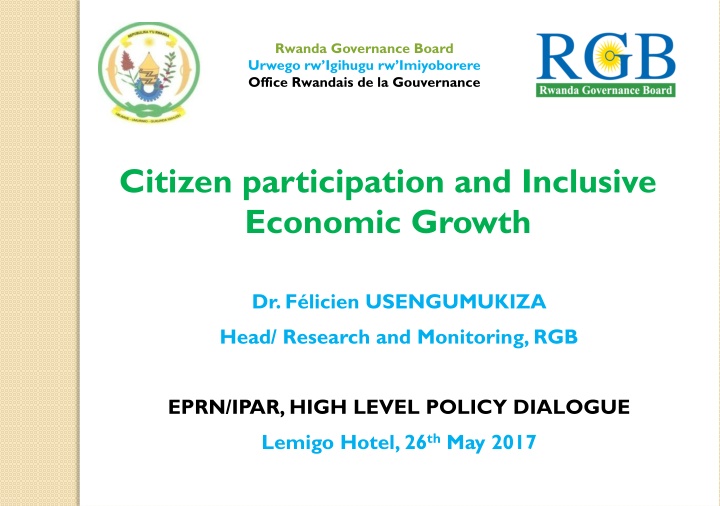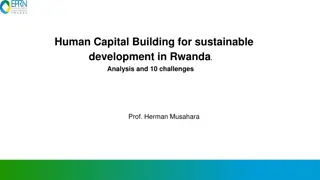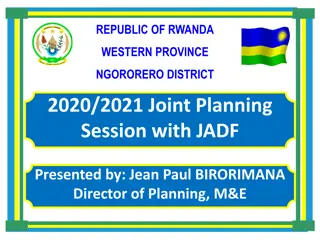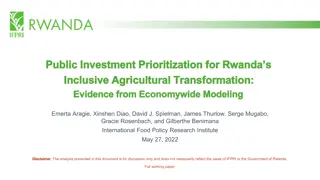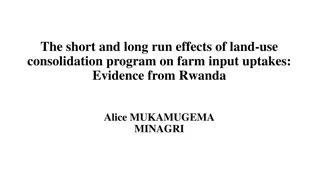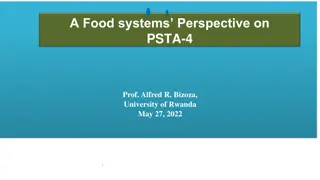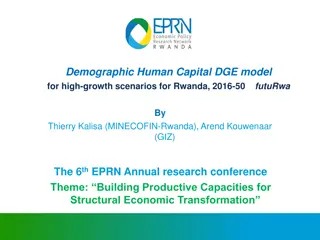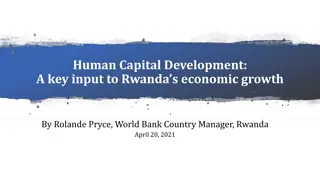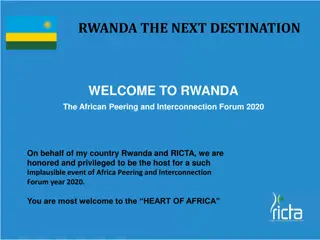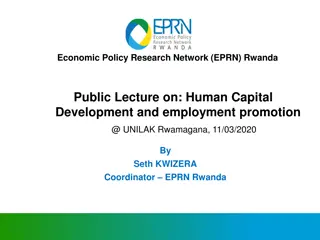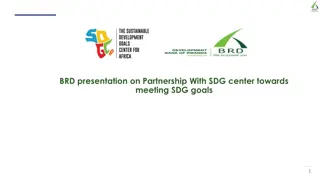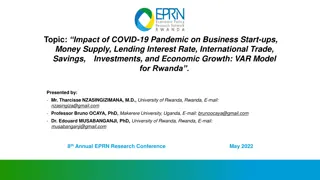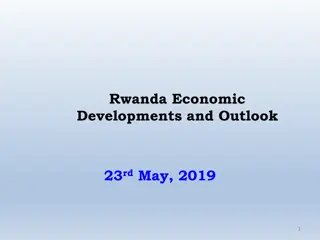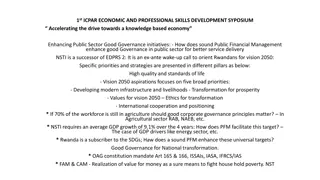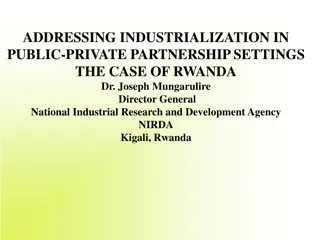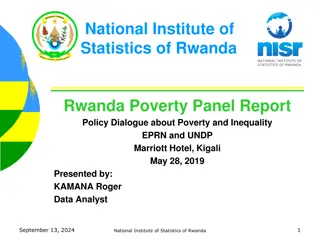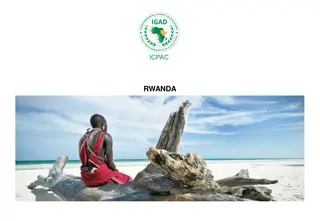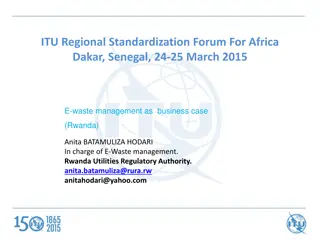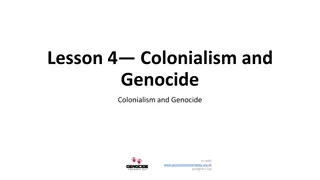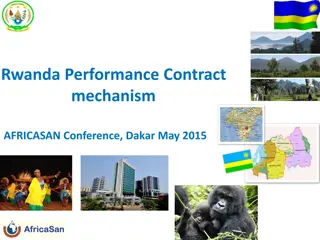Importance of Inclusive Economic Growth and Governance in Rwanda
Inclusive economic growth is crucial as it offers economic opportunities and equal access, enhancing poverty reduction efforts. Societies thrive when based on equality, promoting better development outcomes. The qualities of government for economic growth encompass economic liberalism, democratic participation, social development, administrative accountability, and transparency. Rwanda's Governance Score Card highlights key areas such as rule of law, political rights, civil liberties, safety, human and social development, and control of corruption, emphasizing the country's commitment to good governance.
Download Presentation

Please find below an Image/Link to download the presentation.
The content on the website is provided AS IS for your information and personal use only. It may not be sold, licensed, or shared on other websites without obtaining consent from the author.If you encounter any issues during the download, it is possible that the publisher has removed the file from their server.
You are allowed to download the files provided on this website for personal or commercial use, subject to the condition that they are used lawfully. All files are the property of their respective owners.
The content on the website is provided AS IS for your information and personal use only. It may not be sold, licensed, or shared on other websites without obtaining consent from the author.
E N D
Presentation Transcript
Rwanda Governance Board Urwego rw Igihugu rw Imiyoborere Office Rwandais de la Gouvernance Citizen participation and Inclusive Economic Growth Dr. F licien USENGUMUKIZA Head/ Research and Monitoring, RGB EPRN/IPAR, HIGH LEVEL POLICY DIALOGUE Lemigo Hotel, 26th May 2017
Why Inclusive economic growth matters? Growth is inclusive when it creates economic opportunities along with ensuring equal access to them. Apart from addressing the issue of inequality, the inclusive growth may also make the poverty reduction efforts more effective by explicitly creating productive economic opportunities for the poor and vulnerable sections of the society.
Why Inclusive economic growth matters? (Contd) Inclusive growth is both an outcome and a process Societies based on equality tend to perform better in development. For instance, countries with more equal income distribution are likely to achieve higher rates of poverty reduction than very unequal countries. Inclusive growth ensures that everyone can participate in the growth process, both in terms of decision-making for organizing the growth progression as well as in participating in the growth itself. Inclusive growth implies participation and benefit-sharing. Participation without benefit sharing will make growth unjust
Qualities of Government for Economic Growth and Democratic participation Economic liberalism Private ownership, investment, equity Political pluralism Democracy, participation, decentralization Social development Human rights, law, judiciary, press, social protection Administrative accountability More transparency, less corruption aimed at economy, efficiency, effectiveness
Summary of the Rwanda Governance Score Card 2016 1 Rule of Law Performance of the Judiciary 79.68 75.02 Performance of the Prosecution 91.80 Access to justice 76.48 Performance of The Legislature 72.27 The use of ICT in Justice Service 82.85 2 Political rights and Civil Liberties Democratic Rights and Freedoms 81.83 Core 97.78 83.10 Vibrancy of Non-State actors in policy formulation 67.33 Rights to Media Freedom 85.85 Political parties 74.93 Access to Public Information 78.21 Respect for human rights 85.60 international human rights conventions Registration and operations 3 Participation and Inclusiveness Citizen participation 76.48 61.93 Decentralization 77.20 Civil society participation 72.45 Gender equality in leadership 83.72 Power sharing 87.10 4 Safety and Security Maintaining security 92.62 94.44 National security 99.73 Personal and Property Safety 89.20 Reconciliation, social cohesion and Unity 87.11 5 Investing in Human and Social Development Education 79.98 74.88 Health 80.51 Social Protection 63.38 Environmental resilience 80.44 6 Control of Corruption, Transparency and Accountability Incidence of corruption 86.13 86.56 Control of Corruption 87.77 Transparency and accountability 85.78 7 Quality of Service delivery Service delivery in Local 72.93 74.30 Service delivery in Justice Sector 75.75 Service delivery in Social 68.20 Service delivery in Economic Sector 73.47 Administration Sector 8 Economic and Corporate Governance Macro-economic indicators 76.82 79.59 National Capital and Export Promotion 53.03 Business Environment Promotion 83.14 SMEs Development and Cross-border Trade 78.36 Private Sector 90.00 Promotion
Real governance and development issues: Case of Rwanda Home grown solutions (Mediation committees, One Cow per family, Umuganda, Umushyikirano, Inteko z abaturage, Gacaca, Ubudehe, Imihigo, etc) Citizen centered ownership Transformational leadership Sustaining peace and social cohesion Dignity and self worth
Citizen-centered Governance The Case of Citizen Report Card (CRC) The Citizen Report Card (CRC) is an annual publication which aims to ascertain the levels of community satisfaction with regard to services rendered; The research is based on a sample of 11,000 households. The survey covers all the 30 districts of the country and the respondents are disaggregated by sex; The research covers14 sectors of the service delivery at local governance ; In the framework of promoting Good Governance principles and accountability, It was decided that 10% of CRC findings contribute in Districts performance evaluation.
Representation of Villages sampled countrywide - GPS 10/10/2024
Summary of CRC findings in 2015 and 2016 Indicator CRC2015 CRC 2016 Education Agriculture Livestock Local Administration Justice Governance and Social Cohesion Health Hygiene and Sanitation Social protection Infrastructure Land Security 63.4% 55.3% 58.0% 74.3% 76.7% 89.4% 73.2% 48.4% 54.2% 75.9% 62.7% 89.1% 77.4% 64.8% 62.2% 74.9% 58.6% 61.2% 53.1% 67.3% 90.0% 80.7% 64.7% 86.5% 86.9% GBV and common violence Citizen Participation AVERAGE 51.0% 71.1% 58.9% 67.7%
Level of Citizen Participation in some government programs Preparation of District Action Plan 24.3% Preparation of District Budget 21.8% Preparation of District Performance Contracts 39.8% Decision Making 48.4% Attending and giving views in citizen forums 71.8% Election of leaders 79.9% Volunteering 72.2% Attending Public works Day(umuganda) 80.0% Holding leaders accountable 63.3% Resolving issues of other Citizens 71.7% Classfying Citizens into Ubudehe Categories 59.3% Selecting VUP beneficiaries 57.6% Selecting Girinka beneficiaries 58.5% Building shelter for the vulnerable 64.7% Source: CRC 2016
Citizen participation and Inclusiveness in Government programs
Rwandas Economic Development is based on clear and good defined programs Rwanda contributed in the preparation of SDGs The major aspiration of Vision 2020 is to transform Rwanda s economy into a middle income country...this will not be achieved unless we transform from a subsistence agriculture economy to a knowledge-based society, with high levels of savings and private investment. EDPRS II MDGs, 2015 Vision, 2020 International Economic Good Governance and HRD and Knowledge A Private sector-led a Capable State Market oriented based Economy Productive and Regional and Infrastructure Development Integration Agriculture Economy
EDPRS I was focusing on three flagships aiming at poverty reduction This flagship aims to address extreme poverty and vulnerability in the rural area. It has thee components: public works, encourage dvpt. of cooperatives and SMEs and social service Sustainable Growth for Jobs and Exports Vision 2020 Umurenge The EDPRS priorities of the strategy are embodied in three flagship programmes This flagship aims to boost growth by enhancing competitiveness, private sector investment and innovation, agricultural productivity, exports and ICT competences Governance is emphasizing on national unity and reconciliation, decentralization, rule of law, efficient of public administration and fight against corruption Governance
The basic goal of EDPRS 2 is better quality of lives for all Rwandans through rapid economic growth and accelerated poverty reduction. EDPRS II Productivity and Youth Employment Economic Transformation Rural Accountable Governance Development
Citizen participation is having a positive impact on Economic performance Indicator Status in 2000 6.2 Current status 5.9 Proposed target 11.5 Average GDP growth rate (%) GDP per capita in US$ 220 729 1240 Percentage of population under poverty line 60.4 39.1 20 Gini- Coefficient 0.454 0.448 0.35 Access to clean water (% of population ) 52 84.8 100 Life expectancy (years) 49 66.7 66 Agricultural population (%) 90 71.6 50 Literacy rate (%) 48 86.2 100 Urban population (%) Access to electricity (% of population) 10 2 14.8 24 35 75
Rwandan Economic Growth is an indicator of Economic Transformation 14 Economic Growth 2000-2016 13.2 12 11.2 10 9.4 9.2 8.9 8.8 8.5 8.4 7.8 7.6 7.6 7.5 8 7.4 6.2 5.9 6 4.7 4 2.2 2 0 2000 2001 2002 2003 2004 2005 2006 2007 2008 2009 2010 2011 2012 2013 2014 2015 2016
Rwandan Economic Growth is an indicator of Economic Transformation GDP per Capita 2000-2016 800 735 729 728 710 698 700 635 579 600 554 513 500 414 400 350 295 300 245 225 221 211 206 200 100 0 2000 2001 2002 2003 2004 2005 2006 2007 2008 2009 2010 2011 2012 2013 2014 2015 2016
Citizen participation in Global Agenda Sustainable Development Goals (SDGs)
Objectives of the SDGs consultations The main objective of the SDG consultations was to acquire inclusive and participatory opinions on governance, peace, and rule of law, from national and sub-national stakeholders, including grassroots communities. The aim was to inform the process for indicators of the post-2015 SDGs to align with national policies and priorities.
Methodology This methodology incorporated both quantitative and qualitative research technics. All the parties involved worked collaboratively on the data collection especially for the qualitative phase to ensure that all the relevant information areas were covered. Quantitative research entailed desk research while qualitative phase entailed video recording and note taking in the specified regions. Qualitative Approach Video Coverage/Filming and Note Taking of consultations. Translations and transcription of films. Report Writing Quantitative Approach Desk Research; Review of pre existing data on governance, targets and indicators
Video Coverage and Note taking participants (Project Stakeholders) 10 JADF Members including 2 executive committee, 2 private sector, 2 international FBO/NGO, 2 FBO, 2 local NGO 3 District officials (Mayor, Vice-mayor, Director of good governance 2 youth representatives (District level) 2 women representatives (District levels) 3 Security (Army and Police-District levels) 3 council members 1 persons with disabilities representative I Umudugudu (village) representative I cell representative 2 sector executive secretary 5 Mediators committee 1 MAJ 10 others (2 hospital,2 schools, 2 political parties, 2 cooperatives, 2 media)
Citizen participation through Homegrown initiatives as a key pillar of Good Governance in Rwanda
Some applied HGIs in socio-economic transformation of Rwanda Public Works (Umuganda) Performance Contracts (Imihigo) Participatory socio-economic development mechanism (Ubudehe) One Cow per Family (Girinka)
Some applied HGIs in socio-economic transformation of Rwanda Mediation Committees (Abunzi) School of Civic Education (Itorero) National Dialogue (Umushyikirano) National Leadership Retreat (Umwiherero)
Governance Month as an evidence of Citizen participation 25
Key Governance Outputs in Rwanda driven by Home-grown initiatives Uplifted from poverty level in 5 years 1 million Economic Growth in last decade (2000 -2016) 8% Access to justice 80% Universal Access to Health Insurance 96% Aspiration to Rwandaness Ubunyarwanda 98% HGIs Gender parity in leadership: 63.7% of Women in the parliament- (World record) Resilience of Rwandans Secondary School Completion 82% Transformational Leadership Easy Doing Business : 46/188 Net primary Enrollment 95.9% Public confidence in security organs 96% Timely assets declaration 97% Access to 9YBE 97%
and some areas need more efforts for better improvement. Balance of Payment Deficit Rural Regional and international Security Development Urbanization and Land Management Population Growth Income distribution Youth Infrastructure employment
